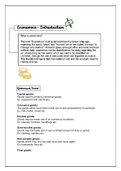Summary
Summary Economic Principles: Introduction to economics, principles, definitions, background, demand and supply, production, income and spending etc.
- Course
- Institution
Summarises demand and supply and other sections and a breakdown of essential definitions and terms used in the Module. Ensures help with understanding the theory in order for you to grasp the content of the module and understand it more and what is the main key areas to take note of and focus on. ...
[Show more]



